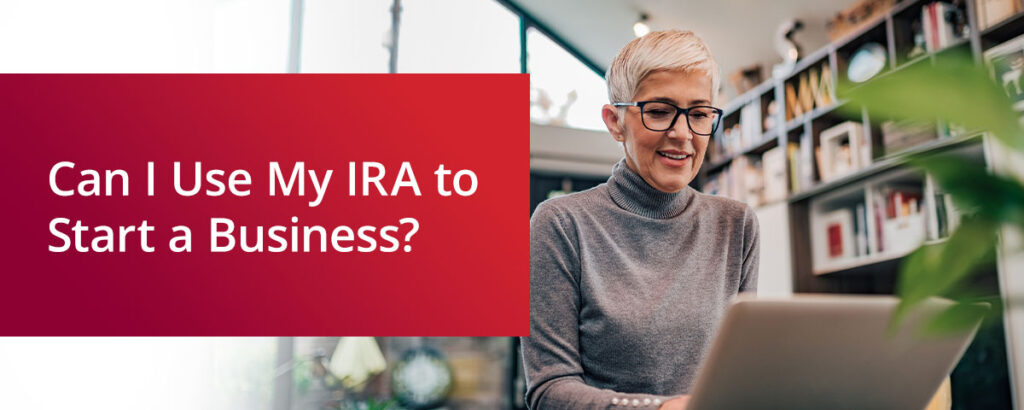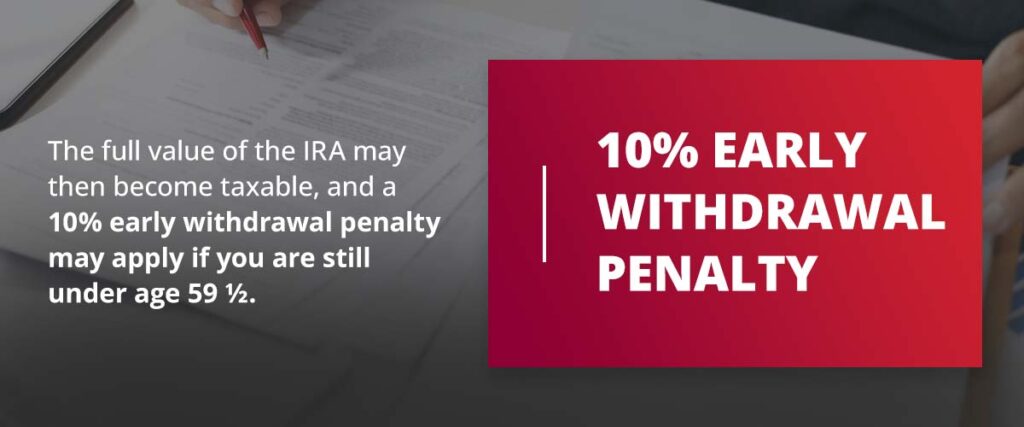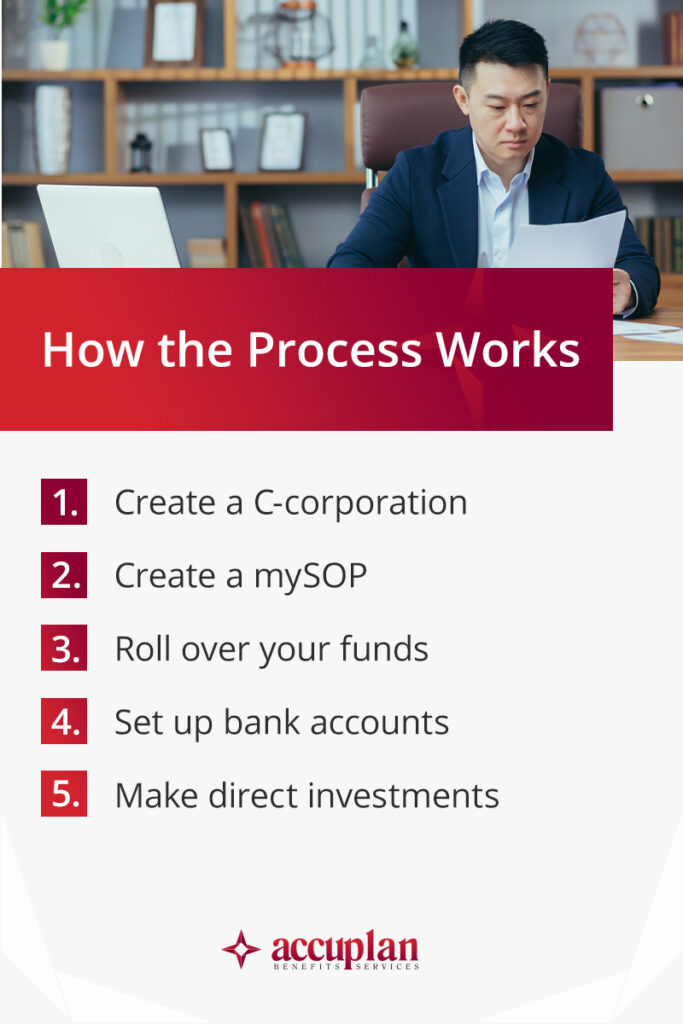
Many people cannot start their own businesses for one reason — they lack the capital needed to buy equipment, a building, products and supplies. Inadequate funds can often deter people from creating their dream company, but if you have a retirement account like an IRA or a 401(k), you can secure needed capital. You can open or convert your current accounts to self-directed to get started.
This guide explores how you might use retirement accounts like self-directed individual retirement accounts (IRAs), 401(k) plans and rollovers for business startups (ROBS) to fund your business. We also cover how they differ from one another and which types of businesses are compliant and noncompliant with Internal Revenue Service (IRS) rules.
Introduction to Using IRAs for Business Funding
IRAs offer an excellent way to receive favorable tax arrangements when funds go into the account. They may also allow you to use retirement assets to fund a business with tax-free withdrawals under certain circumstances.
Self-directed IRAs differ from conventional IRAs since they let you save for retirement with unconventional assets like cryptocurrencies and real estate. If you have this type of retirement account, you may be able to use non-traditional assets as investments and diversify those investments with tax advantages.
While you can use the retirement money already in your IRA account as an investment for your business, it’s still important to acknowledge the different IRS rules and guidelines regarding how and when you use your IRA funds for business.
One IRS-approved method for borrowing IRA funds is the 60-day distribution rule, also called 60-day rollovers. In this method, the IRS allows you 60 days from the date you receive your retirement plan distribution to roll over into another plan. This grace period may allow you to temporarily borrow money from your standard IRA.
Make sure to borrow and withdraw IRA funds for your business according to IRA guidelines. If you overlook any IRS rule, you may be subject to additional tax on an amount or early withdrawal fees if you withdraw IRA funds improperly before age 59 ½. When this happens, it is known as a prohibited transaction.
A prohibited transaction is any improper transaction between an IRA and a disqualified person. Disqualified persons typically include:
- The owner of the IRA plan
- Their spouse
- Their descendants
- Their descendants’ spouses
- Their financial advisor
- Certain business partners
- Fiduciaries of their account
Some instances in which a prohibited transaction occurs might be using IRA funds as collateral for a loan or using the account to buy real estate. When this happens, the IRS may cease to treat the account as an IRA and distribute the remaining money to the owner. The full value of the IRA may then become taxable, and a 10% early withdrawal penalty may apply if you are still under age 59 ½.

Fortunately, this guide explains some things to avoid to negate penalties and noncompliance and addresses best practices and appropriate processes to follow for improved compliance when using retirement funds to start a business.
Startup Investment Opportunities With IRAs
Before creating your business with retirement plan funds, you must understand which types of companies are eligible and non-eligible for starting with IRA funds. Your venture is unlikely to be a prohibited transaction if the total amount of the IRA investment money plus non-retirement plan funds from the IRA owner do not equate to 50% or more of the company.
It is also not a prohibited transaction if the IRA owner is not the company’s employee, director, officer or 10% or more shareholder and is not making the investment to achieve the company’s obligation.
Some examples of non-eligible investments that are considered a prohibited transaction include:
- Loans to your business and disqualified persons: The IRS prohibits IRA owners from using IRA funds as loan money to themselves or their businesses. Your IRA also should not lend money to any disqualified persons. So if any LLC, partnership, other entity or your own business is owned 50% or more by a disqualified person, you may not loan money to them from your IRA or use the money as a down payment on a loan unless it is a non-recourse loan in which there is no guarantee.
- A business that invests in collectibles: If your IRA engages in a prohibited transaction concerning collectibles, you may expect taxes and penalties. Collectibles are items like artwork, certain metals, automobiles, stamps and rugs. You may be penalized if the money you distribute to your business is for collectibles.
- Property owned by disqualified persons or your business: It is a prohibited transaction to use your IRA funds to purchase your own property or any property owned by you, a disqualified person, your LLC or other corporations.
- Property and assets for personal use: One of the rules of an IRA is that it should not benefit you in the present time unless you are over 59 ½ and eligible to receive your IRA money. Try to avoid using your IRA funds on a business that will personally benefit you at the current time or property and assets for the business to benefit you now. Instead, the IRA should receive the profits from the investment in your business, which only gets distributed to you once you are officially retired, helping you adhere to IRS rules.
Self-Directed IRA vs. Rollovers for Business Startups
ROBS is a popular business financing option that offers an easier way to roll over retirement account funds into your business, also known as 401(k) business financing.
Using the ROBS approach requires registering your business as a C corporation and having a new 401(k) plan established by that business. As an entrepreneur and employee, you may roll your current retirement plan into the new 401(k) plan to fund the business debt-free. Investors may choose a ROBS plan when they need to start a new venture with their retirement fund and need to stay involved in day-to-day operations.
Since this method includes aspects that would normally be considered a prohibited transaction in an IRA, it is essential to carry out this process correctly to ensure compliance with IRS regulations. It may be helpful to work with a qualified professional for additional assistance. This way, you may be able to avoid debt, withdrawal fees and tax penalties.
The main difference between a ROBS plan and a self-directed IRA is that ROBS may allow you to receive pay, while you may only access business gains in a self-directed IRA after retirement. Additionally, while ROBS requires you to pay taxes on business gains, a self-directed IRA may not.
To simplify, you may choose to start a business with ROBS if you prefer to receive income as dividend income, an amount distributed to the company’s shareholders as a reward for investing. Corporate tax may apply to this amount. In contrast, using self-directed IRA funds to start a business is usually done for investment purposes, as income flows to the IRA to contribute to long-term retirement goals while staying tax-exempt.
Using Retirement Funds to Start or Grow a Business

Solo or self-directed 401(k) plans are ideal for ventures like sole proprietorships and small businesses. With this plan, you’ll be considered both the employer and an employee, meaning you can make higher contributions to increase the amount of funds you put toward your chosen investments.
It’s important to note that a 401(k) differs from an IRA in that it allows you to borrow from the account through participant loans. You may borrow up to $50,000 or 50% of your account money for any purpose, depending on which is less. Borrowing from your 401(k) plan may require you to repay the loan over up to five years with interest which goes into your plan account.
By using a self-directed 401(k) type called an Employee Stock Ownership Plan (mySOP), you can buy shares in your enterprise, which will transfer money from your retirement account into your business. Through direct ownership of your company, you also control your 401(k) plan’s performance.
Buying a business with IRA funds is still an investment, so you should do your due diligence throughout the process. Avoid investing your entire account into a business, and do extensive research to determine if this option will be right for you.
With your existing IRA, you can transfer some of these funds to a custodian that manages self-directed accounts — such as Accuplan — which allows you to put your money toward alternative investments like a private company.
How the Process Works

Using retirement funds to buy a business involves separate steps. Here’s a more detailed rundown that can help you get started:
- Create a C-corporation: Accuplan will form a C-corp within the appropriate state, making you the salaried manager of this business.
- Create a mySOP: We’ll develop a mySOP for you and file it with the IRS, with you acting as the plan’s trustee.
- Roll over your funds: Transfer your money from a self-directed 401(k) or IRA account to your mySOP by requesting a rollover from your current plan.
- Set up bank accounts: Your plan and company should have checking accounts so you can deposit the rollover funds into your business.
- Make direct investments: Once you’ve established your accounts and requested a rollover, you can begin putting money into your business by purchasing stock in your C-corp with pretax mySOP funds.
Common Pitfalls and How to Avoid Them
Implementing each step correctly is crucial to maintaining compliance while funding your business with your retirement account money. Here are some pitfalls you’ll want to avoid and how you can do so:
- Fees and tax liability: When using a ROBS plan, stay up-to-date on tax liabilities and ways to comply with IRS regulations. Working with the right tax and financial expert or retirement account provider may help you create an effective strategy, maintain plan compliance and prepare important documentation.
- Choosing the wrong plan: It may be helpful to analyze your financial situation and seek expert advice about the ideal business funding option for you. For instance, you might find that using your IRA funds to start a business might be more suitable for you than borrowing money from a 401(k) plan because your financial situation may not allow you to consistently repay the 401(k) account while the IRA may not require repayment.
Get More Information About Using Your IRA and 401(k) Money From Accuplan

Starting a business with your retirement funds can be an excellent choice to enhance the benefits of your account. While there are some important rules to consider, connecting with an expert financial partner might help you choose an appropriate solution. At Accuplan, we have a vast knowledge of the industry, the latest retirement plan regulations and the years of experience needed to help you succeed in your new venture.
Contact us online today to talk to one of our professionals about opening a self-directed IRA or 401(k) account. We are ready to help you open your business and gain control of your funds.
Disclaimer: Our information shouldn’t be relied upon for investment advice but simply for information and educational purposes only. It is not intended to provide, nor should it be relied upon for accounting, legal, tax or investment advice.